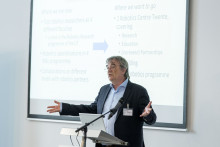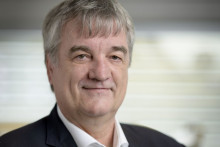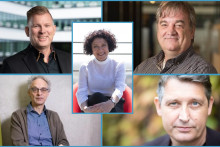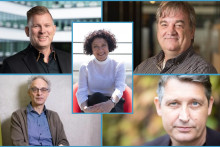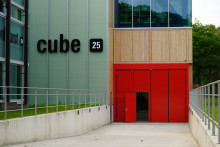What will be important for the ET faculty in 2023?
'For us, housing is a priority this year. 2022 was a transition year. After Covid, suddenly students were walking through the corridors again, which I thought was great to see. Last year, our faculty grew fast, thanks to good scores in various projects and plans. As many as 140 vacancies were filled. Our faculty now employs 520 members of staff, whom we want to offer at least their own desk and preferably a (shared) office. Similarly, we need to provide sufficient lab facilities.'
Will the faculty get more space this year?
'I think so. The construction of the new workshop CUBE is a positive development. Also, across Hengelosestraat, at Kennispark, Fraunhofer's Advanced Manufacturing Center (AMC) will open before the summer. It is likely that the new building will not be filled completely by Fraunhofer right away, and our faculty will be able to use office space. Nevertheless, additional housing solutions are needed. The Horst's occupancy rate is relatively high; our staff enjoy working on campus. This is also due to the nature of the work, for example because of the use of labs. This year, therefore, the pressure on our facilities remains significant.'
Are there more challenges for 2023?
'The whole of society faces major challenges. Think of the climate, the energy crisis and the war in Ukraine. In response, society tends to turn inwards. You can see it in the motion to stop the recruitment of foreign students, or the issues with knowledge security. These are indeed big dilemmas, but we as a university should not turn away from the outside world. That would contradict academic values and the way we work now.'
How is ET dealing with all these challenges?
'For us, sustainability and resilience are important themes. This applies not only to research, but also to education. Together with ITC and BMS, we are working on a new master's degree called Humanitarian Engineering. The minor Sustainability is also highly appreciated by students. Ultimately, we want to move towards a sustainable society. We as ET, together with the other faculties, can contribute to that.'
What else should we look out for in 2023?
'Next year, we will take big steps in the field of Life Long Learning. Also, the cooperation with the VU Amsterdam will enter a new phase. The first students of the joint Mechanical Engineering bachelor have graduated. Now we want to set up joint research lines in addition to education. Furthermore, I foresee a lot of attention this year for the so-called 'research distribution model'. The question is how to deploy funds from the ministry in the best way. That requires choices at central level. It is true that, as dean, I am primarily responsible for my own faculty, but we have to make choices that are ultimately the best for the UT as a whole.'
What are you looking forward to this year?
'One thing I'm looking forward to is the new Robotics Centre, which will open just before the summer. It will be a physical space, probably in the Westhorst. I think the Centre is going to have a big impact. It is a place where students, staff and business meet. There is a growing interest in robotics in society. At first many people felt it was a threat, now more and more see it as an opportunity. Finally, I am really looking forward to ITC moving to our campus. In the field of resilience and climate, we can benefit a lot from each other. For instance, there will be a Living Innovation Lab on the edge of the campus. We will start working on that this year. With the arrival of ITC to campus, the distance between all faculties has literally diminished.'


